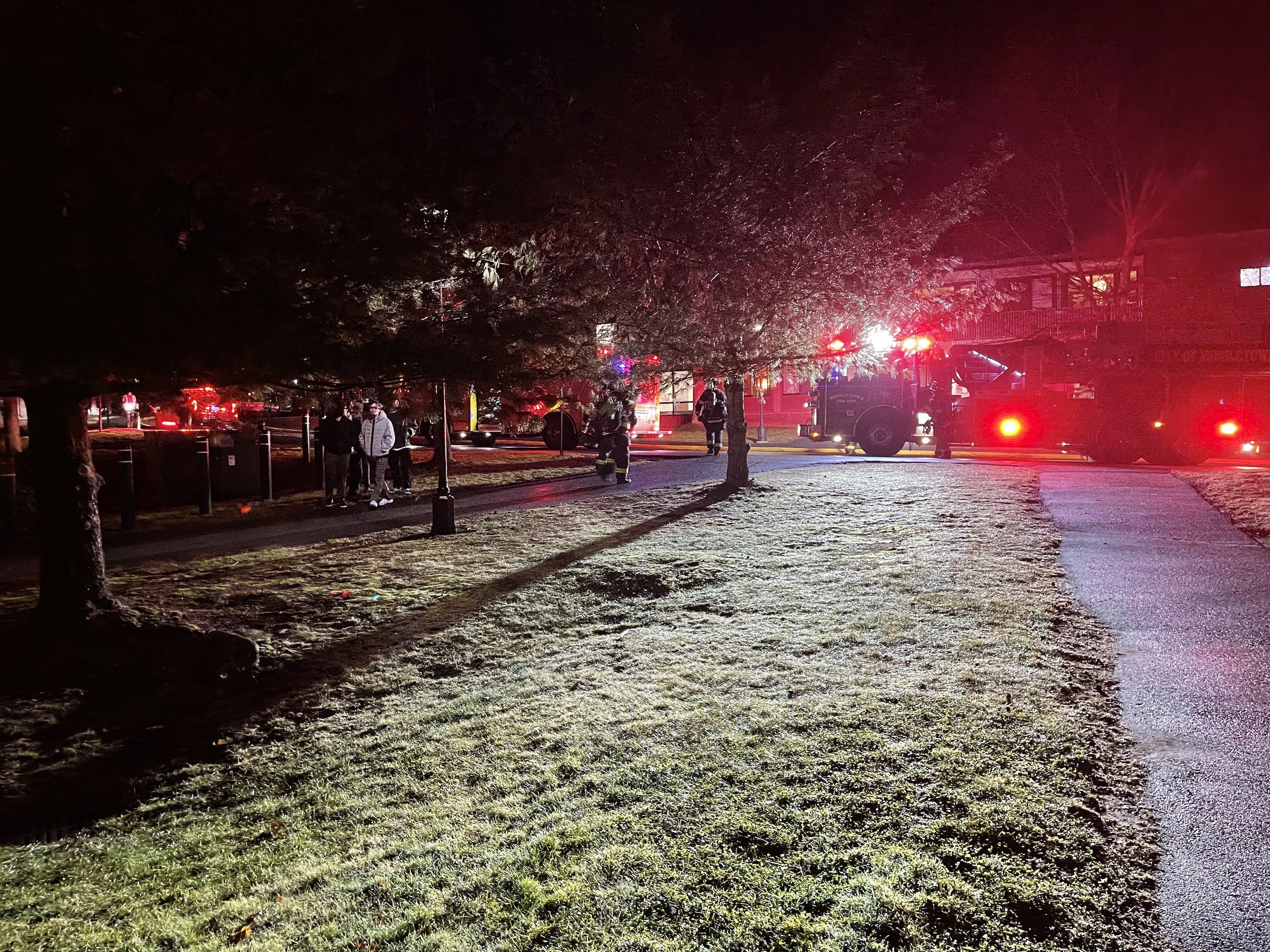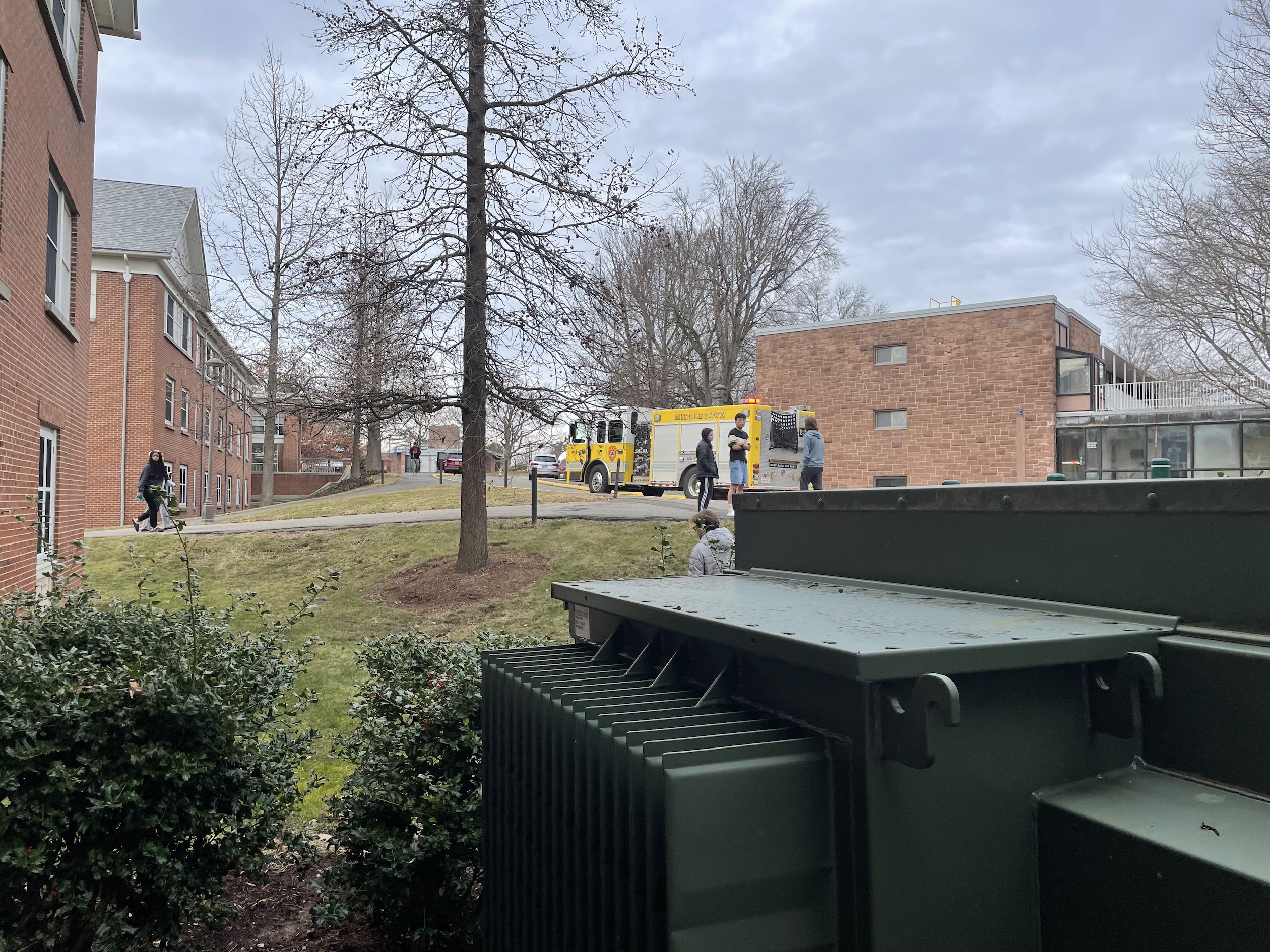
c/o Caleb Henning
Two fire alarms went off in Fauver Apartments on Sunday, Feb. 11. One was after an electrical discharge in a basement apartment at 1:04 a.m., and one resulted from a microwave fire at 2:50 p.m. Both alarms led to a total evacuation of the building.
The First Alarm
Two types of fire alarms can go off in University buildings: audible-only alarms and alarms that also report directly to the fire alarm panel, which then notifies the Middletown Fire Department (MFD). The early morning alarm was audible-only and noticed by a Public Safety (PSafe) officer at 1:04 a.m., who then reported it to the MFD.
“The person there reported electrical sparking from the hood over [their] stove,” Director of Public Safety Scott Rohde said. “It was sparking, and they activated a fire extinguisher.”
While no exact cause for the sparking has been identified at this time, it’s possible that there were problems with the electrical wiring in the hood. The fire extinguishers in Fauver apartments are class A, B, and C—which means that they can be used for wood, liquid, and electrical fires—and emit a dry chemical that puts out fires by layering the flame with a thin coat of dust, which separates the fuel from the oxygen in the air.
Fire alarms like the ones that went off in Fauver and other issues with fire panels are fairly common on campus. PSafe has received 72 fire alarm-related reports between Jan. 1 and Feb. 15 of this year. Around half of the recent reports have been due to fire panel trouble, but the other half were cases of fire alarm activation, often for non-emergencies.

c/o Caleb Henning
“They’re super sensitive, that’s the thing,” Rohde said. “If you’ve ever had one go off, if [you were] dealing with a pizza or even a candle, strong scent, sometimes shower steam, they’re designed to be very sensitive. And the reason is if there’s ever a fire at night when people are sleeping, we want people to evacuate immediately, before that smoke gets to a toxic level.”
According to PSafe Awareness Reports, which date back to Jan. 1, 2023, this case is the only time on the University’s current public record that a fire extinguisher has been activated. Because the dry chemicals from fire extinguishers can be dangerous for people to be around, all residents in the basement of Fauver needed to be evacuated for the night. They were not allowed to return to their rooms until the hallways and any impacted rooms were cleaned and ventilated properly and the dry chemical was fully removed.
“It’s pretty dangerous getting that stuff in your eyes, in your lungs,” Rohde said.
Because of the danger presented by the fire extinguisher’s dry chemical, students who were in Fauver were required to wait outside until the MFD was able to properly contain the risk.
“It was pretty cold,” Nathaniel Greenfield ’24 said. “A group of five firefighters came out [of the building] and I said, ‘Thank you guys so much,’ and they just looked at me, and they were like, ‘We are not done yet,’ and then it took another 45 minutes before we could go back into the building.”
PSafe’s response to the incident was complicated by the fact that the fire extinguisher activation was not the only event they needed to respond to in the basement, which extended the time students spent outside.
“When the officers went there, they discovered a lot of things going on other than just the fire, and that conduct is subject to student non-academic code discipline,” Rohde said. “Some other investigation took place then regarding some activity that was going on in that room that is subject to further proceedings.”
The exact details surrounding the conduct discovered by PSafe officers are currently confidential, as the case is under review by the Dean’s Office, following procedures laid out in the Code of Non-Academic Conduct Violations.
The Second Alarm
While the first fire alarm was audible-only, the second alarm, which went off at 2:50 p.m. on the same day, was reported directly to the fire panel in the building, which alerted MFD, who later notified PSafe of the incident. This alarm was activated by a fire in a microwave that happened while Greenfield was cooking noodles in his apartment.
“It was my apartment,” Greenfield said. “Microwave caught on fire. It was the most smoke I’ve ever seen in my entire life. Nothing was damaged except for the microwave, which is irreparable.”
Fire alarms activate from cooking fairly frequently on campus, with 16 cooking-related cases reported to PSafe between Jan. 1 and Feb. 15 of this year. However, these numbers are slightly lower than average because the semester began on Thursday, Jan. 25, and PSafe generally sees more fire alarms go off during the semester, especially because of how sensitive the systems are.
“It varies a lot,” Rohde said. “In the summer, when students aren’t here, it’s a much smaller number. When everybody’s here in residence, roughly 25 to 30 [fire alarms are activated] a month.”
According to the Residential Life website, students are advised to keep kitchen doors closed while cooking. Kitchens in University buildings have heat detectors, which don’t activate fire alarm systems, while all University rooms have smoke detectors, which will activate the building’s fire alarm system if the smoke remains present for more than a short time. Due to the large volume of smoke in Greenfield’s kitchen, the alarm in his apartment activated, which triggered alarms throughout the building when the smoke didn’t immediately dissipate.
“In the first maybe minute of the fire, at which point I think maybe the flame had already gone out, it was smoking so much,” Greenfield said. “All of my roommates who were home…we all grabbed pillows and blankets and started trying to fan the smoke out of our apartment. In doing so, we all inhaled quite a bit of smoke. And then for the next four or five hours, every time I would breathe in, it would smell like burnt popcorn.”
The large amount of smoke was due to both the burning noodles and the fact that the microwave itself caught on fire. Greenfield’s microwave crumpled in on itself and turned brown because of fire damage and needed to be removed by firefighters. Inhaling smoke is incredibly dangerous and is one of the leading causes of death from fires. Fortunately, Greenfield did not suffer any health issues from the fire.
“I’m okay healthwise,” Greenfield said. “The fire department didn’t seem concerned. They just went into our apartment, they removed our microwave, and they opened up all of the doors and windows to air it out.”
Caleb Henning can be reached at chenning@wesleyan.edu.
-
Temp Mail